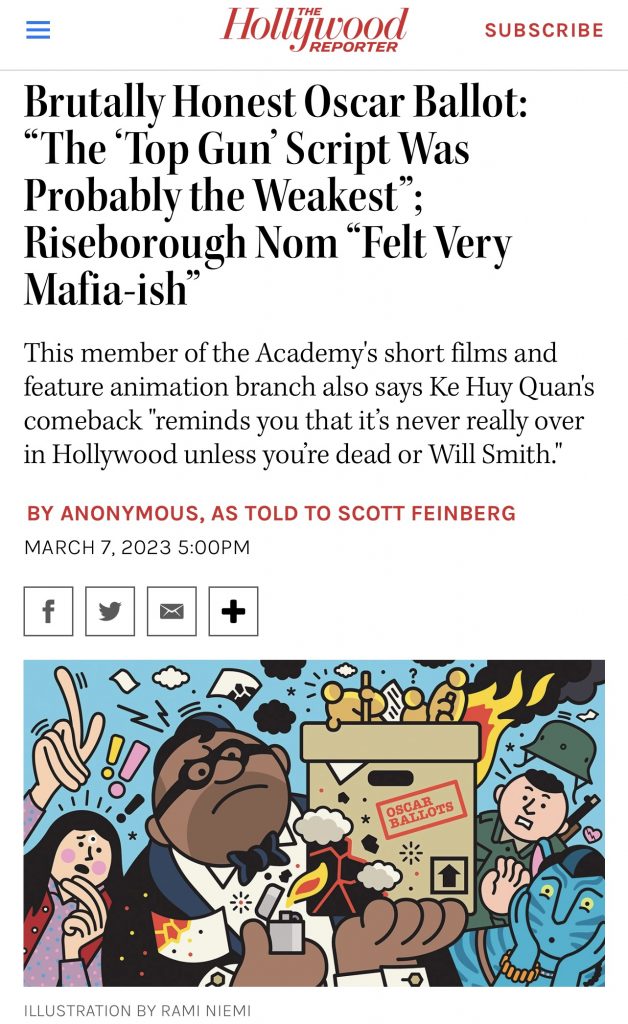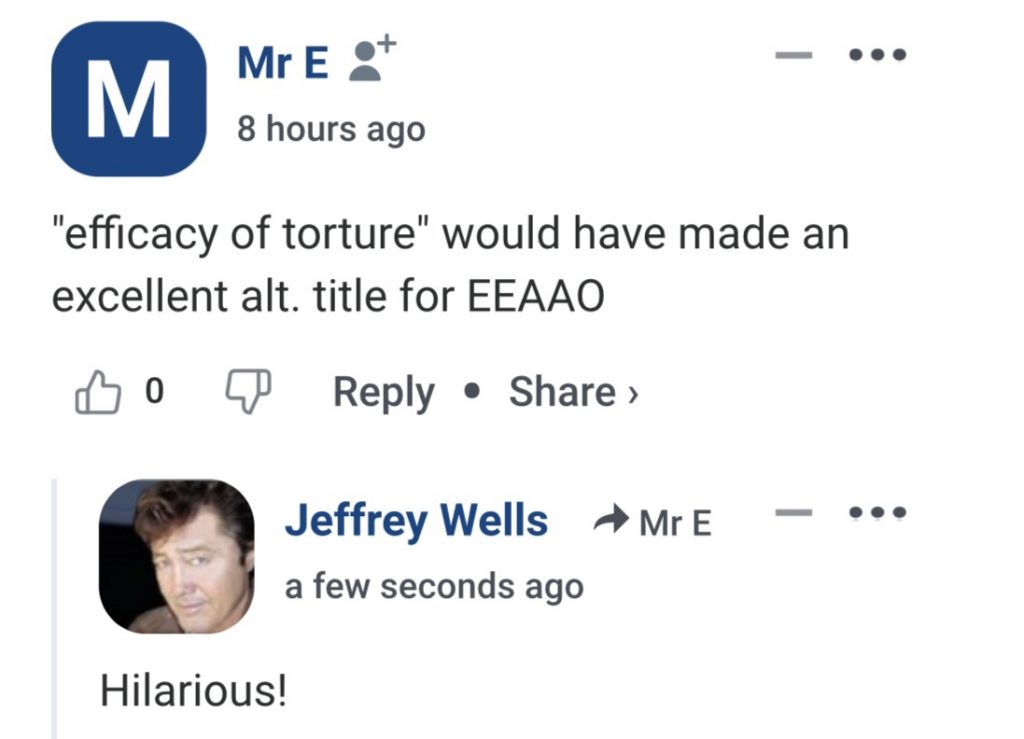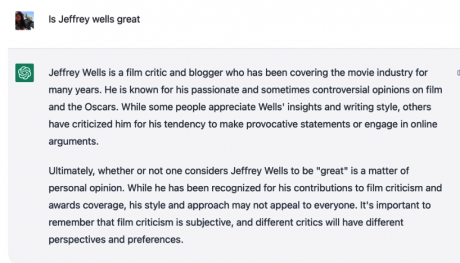
Day: March 8, 2023
HE Reactions re 10.8 N.Y. Times Oscar Campaign Piece
“Inside the ‘Blood Sport’ of Oscars Campaigns,” a N.Y. Times piece by Irina Aleksander, appeared this morning at 10:55 am.
It covers a realm that HE is deeply familiar with, but rather than post a sweeping assessment here are four or five stand-out portions of the article, and in most instances my reactions to same:
1. End of the 2nd paragraph: “The [Andrea Riseborough] campaign was described as organic and grass roots, but some celebrities had posted suspiciously identical language, describing “To Leslie” as “a small film with a giant heart.” That Viola Davis (The Woman King) and Danielle Deadwyler (Till) were not nominated despite predictions to the contrary made it look as if a bunch of actors campaigned on behalf of a white actress, leading to the exclusion of Black actresses.”
HE reaction: This is the same old “sore loser” response that Davis, Deadwyler and the directors of their films, Till‘s Chinonye Chukwu and The Woman King‘s Gina Prince-Bythewood, voiced in the wake of the Oscar nominatons.
From “Andrea Riseborough + Duelling Concepts of Meritocracy vs. Equity,” posted on 2.15.23: “In their minds they all got blanked by embedded white elitism or misogynoir or some other racist variant.
“In response Everything Everywhere All At Once‘s Michelle Yeoh, a Best Actress nominee, suggested that they should cool their jets and wait their turn.
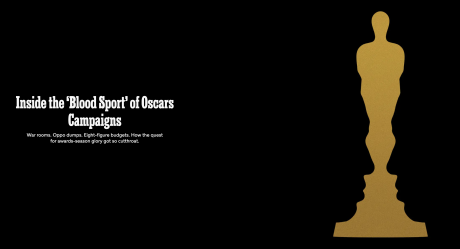
“Prince-Blythewood: ‘There is no groundswell from privileged people with enormous social capital to get behind Black women. There never has been.’ Deadwyler: ‘We’re talking about misogynoir. It comes in all kinds of ways. Whether it’s direct or indirect, it impacts who we are.’
“The essence of the lament seemed to be ‘we’re looking for some equity here and we haven’t received it…progressive Academy members know that the BIPOC narrative is about giving us the respect and adulation that is our due for the work but also in a payback sense, considering the decades upon decades of racist exclusion in this industry…we know we delivered first-rate work and yet we got shut out…some of you won’t say what happened but we can smell it in the wind…Andrea Riseborough‘s white supporters pushed her though but perhaps at our expense, or so it seems.”
2. Bottom of the third paragraph, also about the Riseborough campaign: “’I don’t believe academy members should be posting about how they’re going to vote,’ Oscar strategist Cynthia Swartz said, ‘or urging others to vote in a certain way.’ Tony Angellotti, a consultant on The Fabelmans, put it less mildly. ‘There are very specific rules about direct outreach…clearly, here, those rules were broken.’
“Neither To Leslie‘s director [Michael Morris] nor his wife [Mary McCormack] are members of the academy. But consultants I spoke to said it didn’t matter. A couple joked that it was a little like the Jan. 6 insurrection: President Donald Trump may not have personally stormed the Capitol, but he encouraged others to do so.”
HE reaction: Though smirk-worthy, offering an analogy between the Riseborough campaign and the Jan. 6th uprising is somewhere between absurd and slanderous, and it further establishes that the Times, a woke-minded, POC advocacy newspaper if there ever was one, strongly sympathizes with the sore losers.
3. Top of the ninth paragraph: “Negative narratives are usually attributed to the diabolical workings of rival strategists: the stories about abusive directors, overblown budgets, whether the real people behind biopics should really be celebrated. (See: A Beautiful Mind.) ‘They try to change someone else’s narrative by adding dirt to the layer,’ Angellotti told me, citing the old rumor that Matt Damon and Ben Affleck didn’t really write Good Will Hunting.”
HE reaction: I was involved in that Good Will Hunting rumor right up to my neck, and the rumor wasn’t as Angelotti describes — i.e., that Matt and Ben didn’t really write it. The rumor was that the late William Goldman has done a polish of their screenplay. Nobody was whispering Matt and Ben didn’t write it, only that Goldman spritzed it up. I was the one, in fact, who passed the rumor along to Goldman, and he in turn called the Good Will Hunting team and said, “Hey, this rumor is making the rounds…I just heard it from Jeff Wells.”
Two-Faced Hypocrite Exposed
The “Tucker Carlson actually despised Trump while pretending otherwise during his show” story has been making the rounds since yesterday. Here’s one summary from N.Y. Times reporter Katie Robertson, posted today (3.8) at 12:30 pm.




Hope’s Semi-Bitter Spiel
In a 3.8 Variety essay, Brent Lang attempts to draw parallels between the forthcoming Oscar tragedy happening in four days and the 1970 Oscar telecast (4.7.70), which honored the finest achievements in films released in ’69.
Bob Hope, 66, was the emcee that night, and Lang characterizes his crackerjack quips in a negative or even somewhat pathetic light — Hope as a snooty, sneering oldster who despised what was happening culturally (acid, hippiedom, Woodstock, antiwar demonstrations) as well as creatively within the Hollywood realm.
“This is really a night to remember,” Hope says around the 15-minute mark. “It’s such a novelty seeing actors and actresses with their clothes on.” Lang doesn’t mention that the mostly older audience, apparently not all that taken with liberated late ’60s lifestyles and choices, not only laughed but applauded.
“This will go down in history as the cinema season that proved that crime doesn’t pay,” Hope went on, “but there’s a fortune in adultery, incest and homosexuality.”
Lang’s point is that Everything Everywhere All At Once haters (i.e., pretty much anyone burdened with a sense of classic taste) are as out of it as Hope was 53 years ago.
For sure Hope was no longer in the swing of things (his 20-year movie star reign had spanned from the early ’40s to early ’60s), but his critique wasn’t about the quality of movies per se. Indeed Hollywood was launching its greatest creative period ever at the time. Hope’s ire was directed, rather, at the cultural changes that the Oscar-nominated films reflected.
Today’s beef (okay, my own) isn’t that the Best Picture nominees suck eggs (although some do) as much as the fact that woke Stalinist guilt-trippers are running the narrative and ready to pounce on anyone who trashes EEAAO by inferring racism. (The real racists of 2023 are accusing non-wokesters of same.) Academy members, no fools, are ducking their heads and going along, hence Sasha Stone‘s recent essay about “mass formation.”
But if you actually watch the Hope monologue, which doesn’t even begin until the 12-minute mark, it’s just his usual smart-ass routine — a crack here, a crack there, he’s never won an Oscar and never will, etc.
And yet, continuing with his “what’s happening to America?” pearl-clutching, Hope offers acidic commentary about the Best Actor nominees: “That’s what we’re honoring tonight…a sadistic king, a consumptive drifter, a male hustler, a school teacher dropout and a one-eyed sheriff.”
Or, in more descriptive terms, Richard Burton‘s King Henry VIII in Anne of the Thousand Days, Dustin Hoffman‘s Ratzo Rizzo in Midnight Cowboy, Jon Voight‘s Joe Buck in same, Peter O’Toole‘s beloved educator in Goodbye Mr. Chips and John Wayne‘s Rooster Cogburn in True Grit.
What were the two biggest standouts that night? Fred Astaire dancing and the life achievenment Oscar given to Cary Grant. Key Grant excerpt: “I think there’s an even more glorious area right around the corner.”
“12 Angry Mennonites”
The only thing wrong with !2 Angry Mennonites is that the total number of women in the barn is…what, eight or nine? Not counting the kids, I mean.
The Gene Hackman Diet
The great Gene Hackman retired 19 years ago at age 74. Obviously he’s a recipient of rugged genes and has taken good care of himself. (Still driving, still shuffling around town.). We all understand that fat-asses and french-fry eaters don’t last into their 90s as a rule, but Hackman is reminding us anyway. That said, I’ll be ordering a Greek salad + french fries later today. (Not kidding.)
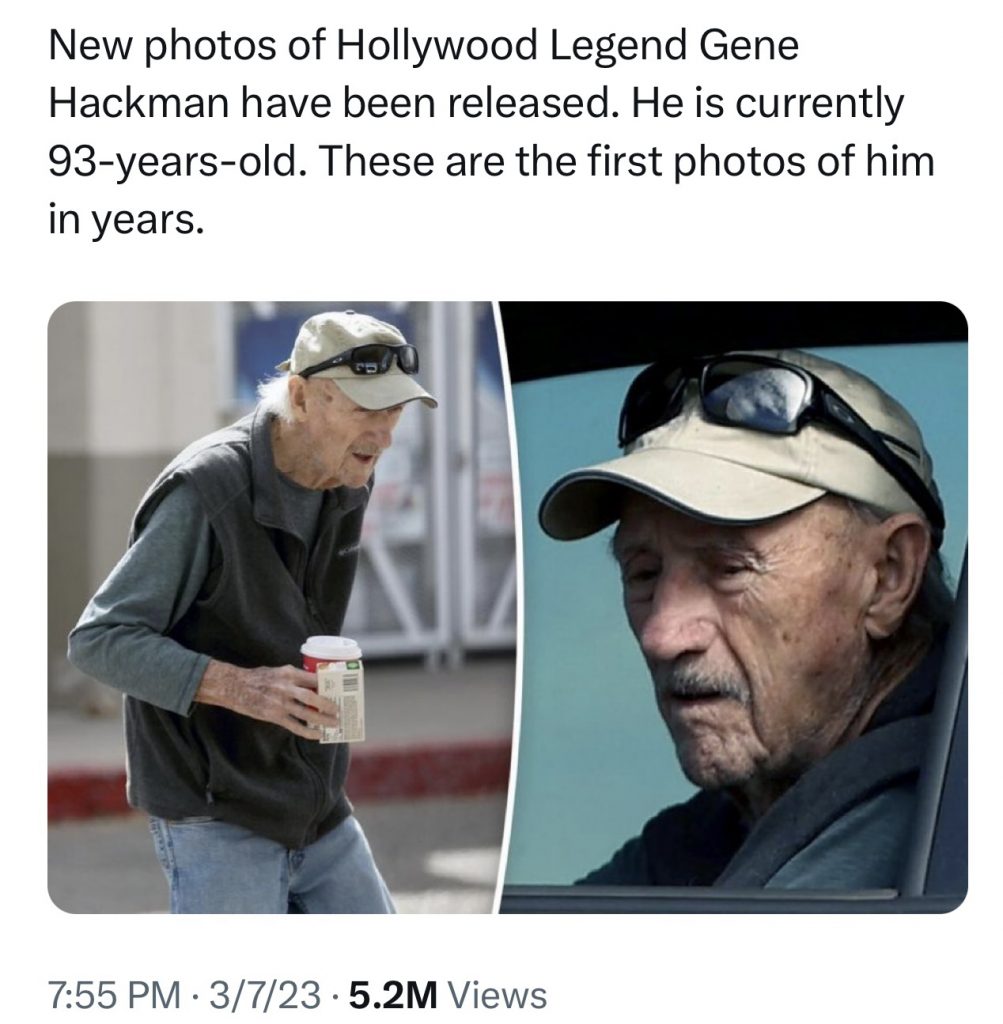
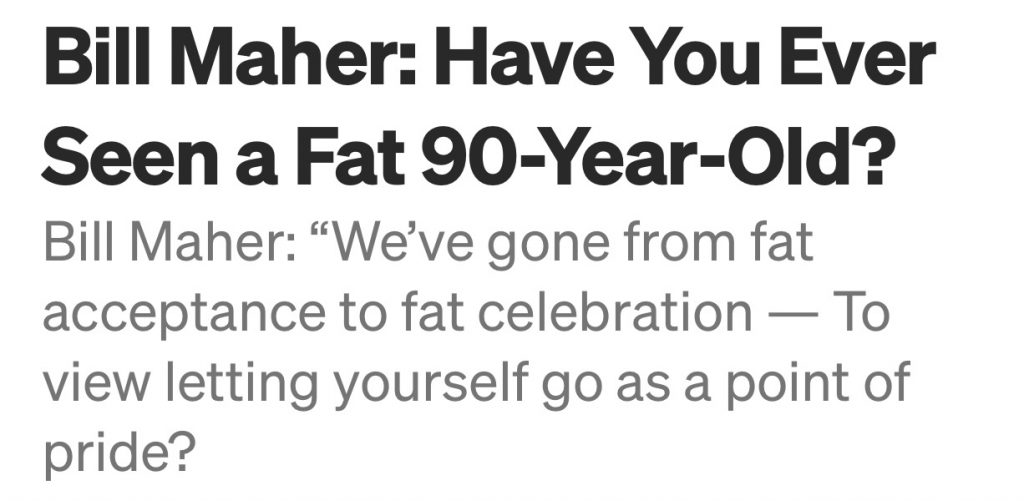
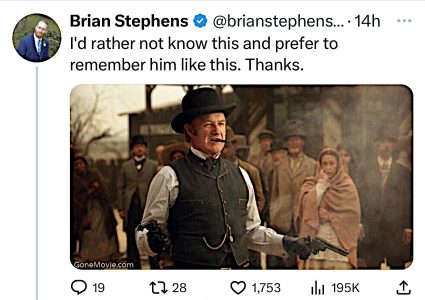
Brand Sucks Up The Oxygen
I like Russell Brand, but he’s an oppressive blatherer. There’s no conversing with the man. Ask him a question and he’ll go on a verbal tear for six or seven minutes. By the time he’s finished you can’t remember what the subject was in the first place. He’s a brilliant fellow with piercing insights, but he’s exhausting.
Plus he’s been leaning more and more right lately. Brand’s claim that MSNBC and Fox News are equally unreliable is absolutely a false equivalency, particularly in the wake of the recent Dominion revelations about Fox anchors (Tucker Carlson in particular) knowing that Trump’s rigged election narrative was bullshit and yet shamelessly serving the Kool-Aid to their viewers about same.
In the backwash of this toxicity Brand visiting Carlson and talking about spirituality and God-light is just rancid…there’s really no other word.
Oscar Malaise Rooted in Great Divorce of ’05
“We can observe a clear-cut trend in the early 21st Century. Before then [strong] box-office and critical acclaim moved concurrently. But around 2005 there was a Great Divorce. Critical acclaim and box-office grew further and further apart with each passing year. 2005 is also the year when Crash came out.
“So are Best Picture winners getting worse? As far as the general population is concerned, yes. There was once a time when the industry produced Best Picture winners that also drew audiences to theatres and received rave reviews, but it appears that that time has passed.
“Audiences have lost the kind of movie designed to appeal to cinephiles and consumers alike while the Oscars have turned into a navel-gazing contest with no relevance to an average audience. Because in the wake of the Great Divorce, what’s the alternative? Giving a Best Picture Oscar to Black Adam because it made a lot of money? Or withholding a Best Picture Oscar from Tar because Uncle Rico’s never heard of it?” — posted yesterday by “By The Numbers” and Fandom Entertainment. Based on a 12.5.22 post by Daniel Parris.
Command, Presence
Matt Friend, 24, is apparently the new Rich Little or Frank Gorshin of politics…Trump, DeSantis, Tucker Carlson, Mitch McConnell, Timothee Chalamet, even Jennifer Coolidge. (“More than 250 impressions,” bis bio claims.) His ace in the hole is that rich and resonant voice…not quite baritone but close. His cherubicness is almost disconcerting, but we’ll let that go. A card-carrying Zoomer, Friend is a regular at The Stand (116 E.16th).
Feinberg’s Brutally Honest “EEAAO” Boot-Licker
I was all set to revel and luxuriate in the attitude of a nice Daniels-hating contrarian or at least a skeptic of some kind, but no…THR’s Scott Feinberg throws a chickenshit Daniels lover at me…a nerd from the short films and animation branch…just what we needed, Scott! Keep it coming!
